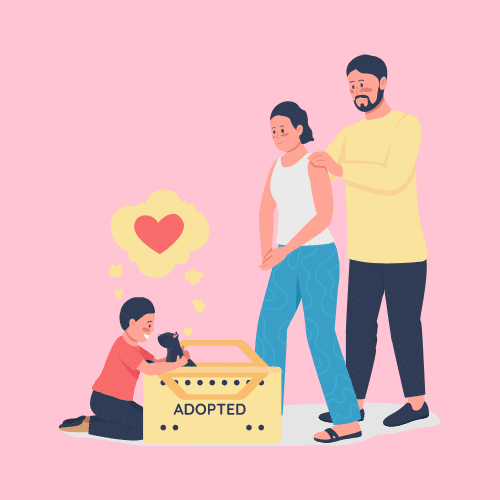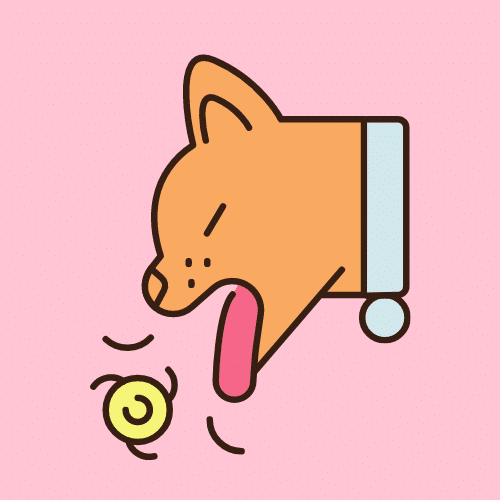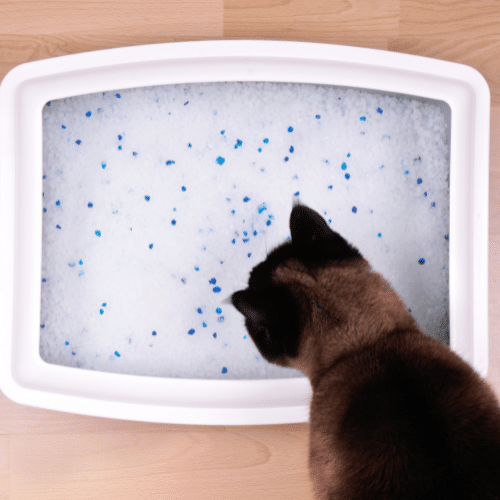If you have just brought home a new cat and see that your newly adopted cat not eating or drinking, you might start to worry, but there’s no need. Kitties may not eat on occasion for several slightly inappropriate causes. In addition, several of these possible reasons have really easy solutions.

An excellent supper may make your cat feel more at ease and joyful and give them the energy to continue growing and having fun throughout the day. To help your furry friend adjust to its new home and new owners with as little inconvenience as possible, it’s a good idea to find out what they’re accustomed to eating before you adopt them.
6 Reasons Why Newly Adopted Cats Not Eating
Change of Location
Cats are picky about where they eat. If you place their food and water bowls at different locations, your newly adopted kitty will stop eating. You should place their food bowls someplace calm, easily accessible, and apart from their litter box and any loud machines, like the washing machine. Make sure you feed your newly adopted kitten in the same location every time. It will make it easier for them to acclimatize to their new habit. That way, they won’t be confused or stop eating.
Not Used to Food
Felines can eat either dry food, canned food, or a combination. If you feed your kitty the same food, they’re used to. It will help them feel less stressed as they get used to living with you.

If you wish to alter their food, do it gradually, mixing the new with the old over a few days, so your pet doesn’t feel overwhelmed or stop eating.
Scared
A new environment might be scary or frightening for a new cat, especially one as little as a kitten. Because of this, it is natural for your cat to experience some anxiety when they initially enter their new place for the first time. Occasionally, this presents as a loss of appetite.

Routine Changed
When you bring a cat home, it may not eat since they’re not in a routine. Your kitty must eat regularly. This is necessary to meet their requirements for both energy and development.
Not Feeling Good
If you notice that your kitten has lost their hunger for a longer period, say 24 hours or more, it is essential that you take them to the veterinarian so that they can rule out any potential health problems or illnesses. Tiredness, weight loss, and lack of interest are all signs of a sick kitten.
Lack of Hygiene
Kitties are exceptionally hygienic compared to other animals. If a kitten isn’t eating its food, it may be because it rejects a dish it doesn’t believe has been rinsed thoroughly enough. When you wash the dish, always use detergent, and give it an extensive rinsing with water afterwards.
5 Tips to Feed Newly Adopted Cat
Check Food Bowl
If your cat lowers its head to eat, check that its whiskers won’t get caught on the edge of its food bowl. You should also clean their bowl carefully and ensure it is in the right place. If your cat doesn’t want to eat, try moving their bowl to see if that makes them want to eat.
Try Different Foods
There are several different things that you may do to encourage your kitty to start eating again. First of all, you should make sure to introduce new food slowly. Changing your pet’s diet up to four times a year can also add a wide range, help you find out what they like best, and protect against any dietary problems or allergies.
Re-Locate the Food Location
It may be easier to put your cat’s food bowl in a corner, but this might stress him out. In the wild, cats eat where they can see what’s going on around them so they can see if a predator is coming.
Instead of putting your cat’s food dish in a corner, consider placing it in a more open place so she can see everything around her. This will help her feel more at ease as she eats.
Consult With Vet
The first and most essential step is to seek the advice of your reputable veterinarian. This can also be helpful since they can give you suggestions for things you may do to get your kitty to start eating again.
Try Outdoor Activities
People who own cats are faced with the difficult choice of determining whether or not to let their feline companions wander outside. Your cat’s life span can be cut short by many things outside. However, many cats have a strong affinity for the great outdoors.
- Cat Disappeared Without a Trace [Guide]
- How to Keep Possums Away From Cat Food?
- Why Is My Cat Scared to Go Outside?
FAQ
Question: When should I worry about my new cat not eating?
Answer: See a vet if your cat stops eating for 24-36 hours despite regular water consumption. A cat can develop life-threatening complications if it is anorexic for several days or weeks.
Question: Is it normal for a new cat to not drink water?
Answer: If you think your kitty isn’t getting enough water to drink, you should contact your veterinarian as soon as possible. Dehydration can signify renal illness, heatstroke, or diabetes in cats. It is in everyone’s best interest to take the cat to the veterinarian regularly to ensure that their cat is in good health.
Question: Should I take the newly adopted cat to the vet?
Answer: Any new cat, no matter how old or young, must see the vet immediately. After adopting a kitten, schedule a visit with your veterinarian within 24-72 hours. You and your cat will have long-term benefits if you take the time to know your veterinarian outside of an emergency crisis.
Verdict
Kitties are sensitive animals with a fussy side that like to show off when it’s time to eat. However, it is normal for new pet owners to get concerned when their kitten does not eat for a few hours. Your adopted cat won’t eat for several reasons, including stress, sickness, or just plain pickiness. However, because kittens are so young and require a great deal of energy to be healthy, it is imperative that you promptly determine the cause of your kitten’s loss of appetite and seek the assistance of a veterinarian if it has gone more than 24 hours without eating.

Doctor of Veterinary Medicine (D.V.M.) at Nation Taiwan University,Master of Science (M.S.) in Biomedical Engineering at National Taiwan University of Science and Technology




